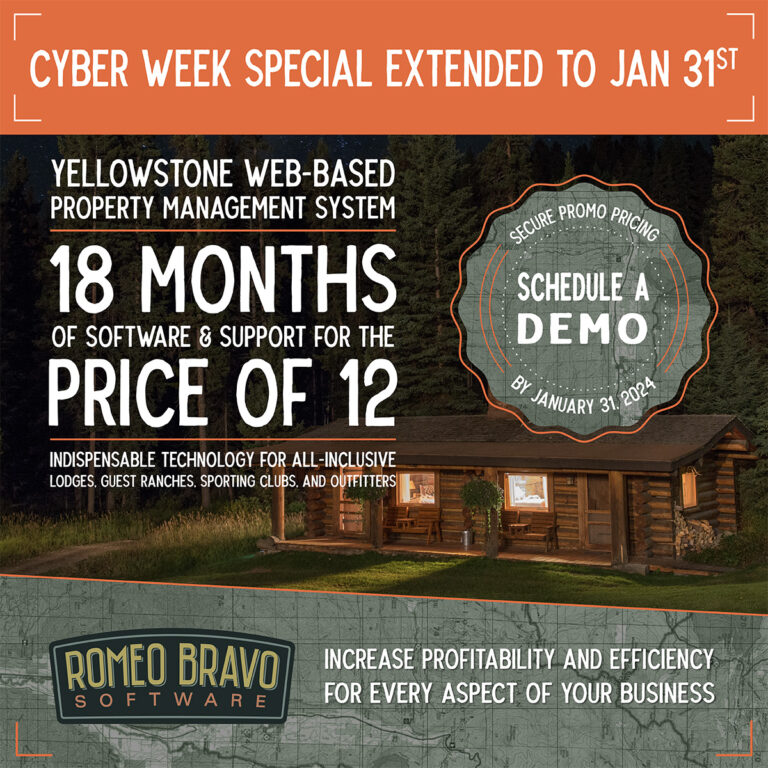Users of Romeo Bravo Software (RBS) are hard working owners and operators of lodge, guest ranch, and outfitting businesses. It’s a colorful cast of characters (each with an independent streak a mile wide). If there is one thing they all have in common, they are only too happy to do a job themselves, especially if it means getting the job done right. They like to stay on top of all the ins and outs of their business, and make a special effort to get to know everyone that makes it go, from their guests and potential guests, to their co-workers and vendors. One might say they tend to be “old-school”, but not never stubborn. Specific to technology, they take a forward thinking approach that helps their lodge, ranch or outfitting business maintain a sharp competitive edge, and most of all, profitability.
Get to know Rick Gehweiler, veteran, published author and current manager of the Bighorn River Lodge in Ft. Smith, Montana. After graduating from the University of North Carolina in 1966, attended Marine Corp Officer Candidate School at Quantico, Virginia, earned his Navy wings in Pensacola, Florida, and served a tour in Vietnam as a helicopter pilot flying combat missions. In 1992 in Bend Oregon he helped establish Central Oregon Veterans Outreach, serving as board president for two years. COVO is a non-profit organization dedicated to providing counseling, housing and job placement for veterans in need. Rick’s passion for fly fishing has taken him to most western states, as well as the Bahamas, Cuba, The Yucatan and Belize. Rick and his wife, Cheryl began fishing the Bighorn in the early 90’s, fell in love with the river and the area returning almost every summer until 2012 when they became managers of the Bighorn River Lodge. “The Bighorn is a very special river and an extremely important natural resource for Montana and the country as a whole.” It comes as no surprise that Rick also served as President of the Bighorn River Alliance for 5 years and volunteered his time and energy into safeguarding the resource upon which so many guides, outfitters, fly shops, and lodges depend.
A Romeo Bravo Software user for the better part of two decades, Rick is among the first generation of lodge managers to pioneer the transition of the operations of a premier fly fishing lodge from pen & paper to a digital property management system. He’s seen numerous and continuous benefits of having done so, but over the years, dependability and efficiency is what he appreciates most about RBS software and support. In a recent conversation with Rick he said: “I’m a realist and BRL is a seasonal lodge in a remote Montana. As a GM entrusted to deliver a world-class guest experience, I wake up everyday knowing there will be a few curveballs I need to knock out of the park. Frankly, it’s the nature of hospitality and navigating those unpredictable challenges is an aspect of the business I very much enjoy. But the last thing I want is a software problem causing an issue for any aspect of the lodge or my guests, and thanks to Romeo Bravo that’s never the case. What’s more, on the rare occasions we ever need help, the support team is always Johnny-on-the-spot. I get calls every month from tech companies making big claims, but the fact is RBS is the only software company that really understands my business and what we need to be successful.”
All of us at RBS are proud to work with Rick and his wife Cheryl. We are grateful for having had the opportunity to come to know them well, and we are huge admirers of their engaging personalities and the gracious hospitality provided at Bighorn River Lodge. We especially thank Rick for his military service, for sharing his memoir in “Pop A Smoke”, and for making personal sacrifices to which all Americans can be grateful.
Thanks for sharing your experiences with our audience Rick, all the best to you and your family in 2024!
Our mission is to provide software that increases sales and profitability
for businesses that focus on adventure travel and outdoor recreation.
Schedule your demo today.
About Pop A Smoke by Rick Gehweiler

Posted by Henry Zybel on June 27, 2022
I believe that crewing on a helicopter—especially piloting one—was one of the most dangerous and difficult assignments in the Vietnam War. Fifty years after the fact, Rick Gehweiler has mined his memory and confirmed my belief with Pop a Smoke: Memoir of a Marine Helicopter Pilot in Vietnam (McFarland, 172 pp. $29.95, paper; $13.49, Kindle). He and I also agree that medics and corpsmen had it just as rough as helicopter crews.
Fresh out of the University of North Carolina and influenced by an uncle (a three-star Navy admiral), Gehweiler enlisted in the Marine Corps. After going through OCS and pilot training he arrived in Phu Bai in 1968 and joined the “Ugly Angels” helicopter squadron HMM-362. They flew the old Sikorsky H-34s, which would be taken out of service the next year.
Gehweiler tells his story as he best remembers it, frequently making the point that many events are deeply etched into his mind forever. He uses the second half of Pop a Smoke to spell out combat events filled with danger and tragedy he took part in. As a lieutenant, he entered the war with barely a clue as to why. Frisky as college fraternity boys, he and other young LTs matured into men of destiny.
“We just were along for the ride,” Gehweiler says, “with no control over what happened. We never discussed the validity of what was going on.” Following their missions, they headed off to the O Club “to see how much we could drink. It was the only way we knew to decompress and try to relax. “
Losing close friends and classmates in combat made him realize that he had to fly “at razor edge’s efficiency.” And he did.
Rick Gehweiler flew 150 missions, and describes about a dozen of them that are doozies. He dazzled me with stories about an overloaded Sikorsky bouncing to get airborne surrounded by NVA troops; extremely hazardous recon inserts and extractions; the time his helicopter was shot down and his copilot killed; night rocket attacks on Phu Bai; and medevac rescues. I only wish he had shared the details of more missions.
Gehweiler displays a few fits of righteous pique, but fundamentally he cares about the welfare of others. At heart, he is a selfless and humble guy who has repressed accounts of his exploits out of modesty, as I see it. He does include humorous accounts of lieutenants outwitting their superiors, noting that his “whole tour seemed like a full season of Rod Serling’s The Twilight Zone.”
Like other youthful troops, Rick Gehweiler came to realize how the post-traumatic stress disorder that still clouds his personality developed. As I interpret his work, he had difficulty in seeing the inevitable while swept up in combat and suffered the repercussions of combat trauma.
He ends the book by discussing his and others’ treatment for PTSD, “a disease,” he says, “we will always have.”
Gehweiler adds an epilogue that analyzes America’s decision to get involved in the war, its consequences, and its lessons. He emphasizes the pitfalls of poor decision making at high levels of government.
Not surprisingly, he reflects the attitude of many Vietnam War veterans, myself included, when he says: “As bad as it could be some days, it was still the most challenging, exhilarating, and satisfying time in my life. As odd as it may sound, I still miss it, and would do it again in a heartbeat.”
For more on Rick’s experience with the Marines in Vietnam see this interview on YouTube.




